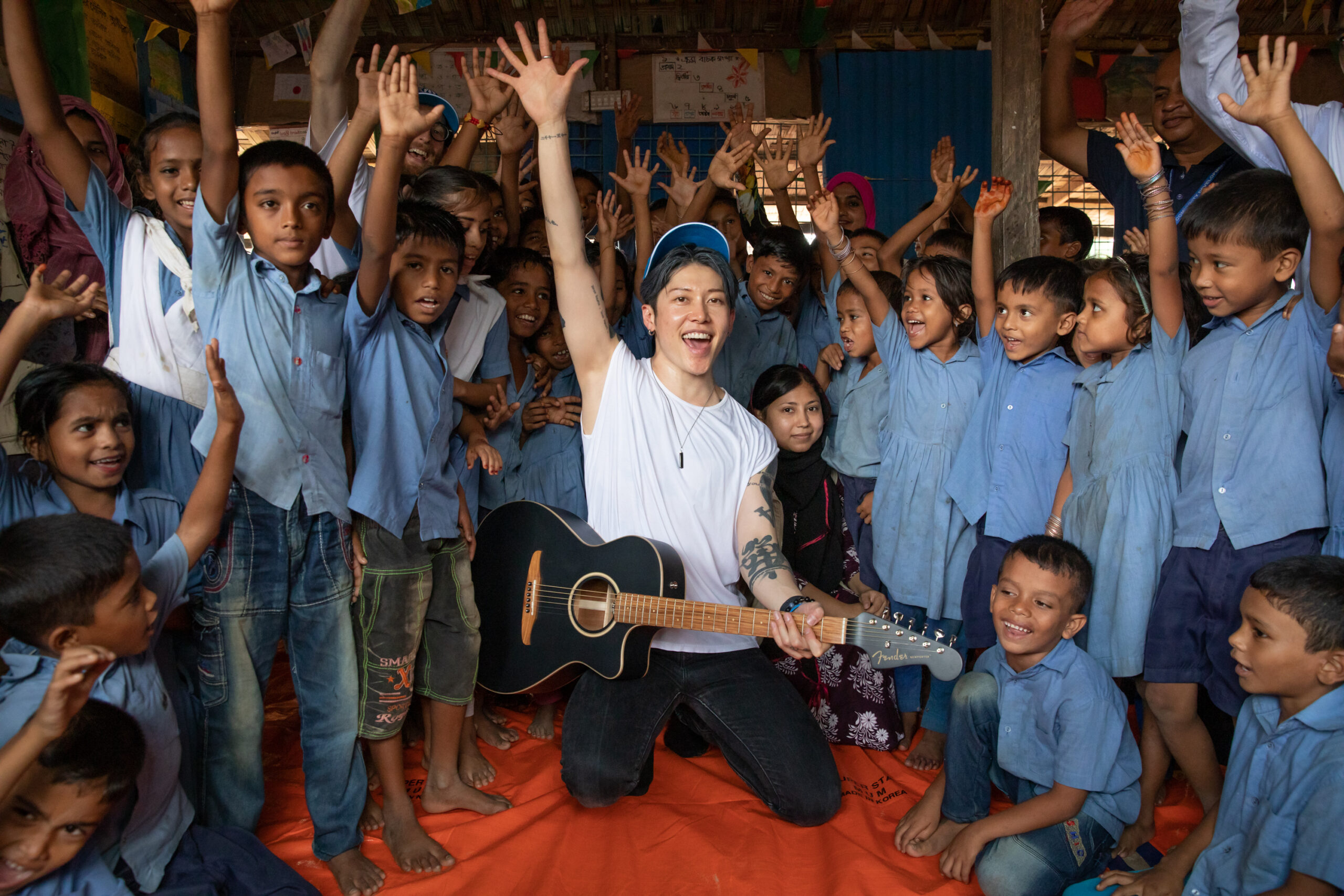© UNHCR/Allan Kipotrich Cheruiyot
Having devised a unique slapping method of playing the guitar without a pick, inspired by the Japanese shamisen, MIYAVI has been called the “Samurai Guitarist.” He has played in over 30 countries so far, in eight world tours. He is also active as an actor, having appeared in films such as Unbroken, which was directed by United Nations High Commissioner for Refugees (UNHCR) Special Envoy Angelina Jolie. In 2017, he became the first UNHCR Goodwill Ambassador in Japan. With UNHCR, he has visited Lebanon, Thailand, Bangladesh, Kenya, and Colombia.
UNHCR Goodwill Ambassador MIYAVI
■ Japanese original text is here (UNIC official blog, posted in December 2020)
日本語の原文はこちら(国連広報センターブログに2020年12月に寄稿)
At the beginning of 2020, I was on tour travelling to countries such as Brazil and Hawaii. During that time, I visited a refugee camp in Colombia as a UNHCR Goodwill Ambassador. I spoke with refugees who had fled from Venezuela, locals providing support, and UNHCR staff. In my work as a UNHCR Goodwill Ambassador, I feel it is important to see what is happening on the ground and experience it as reality as much as possible, so visiting refugee camps is vital to my activities.
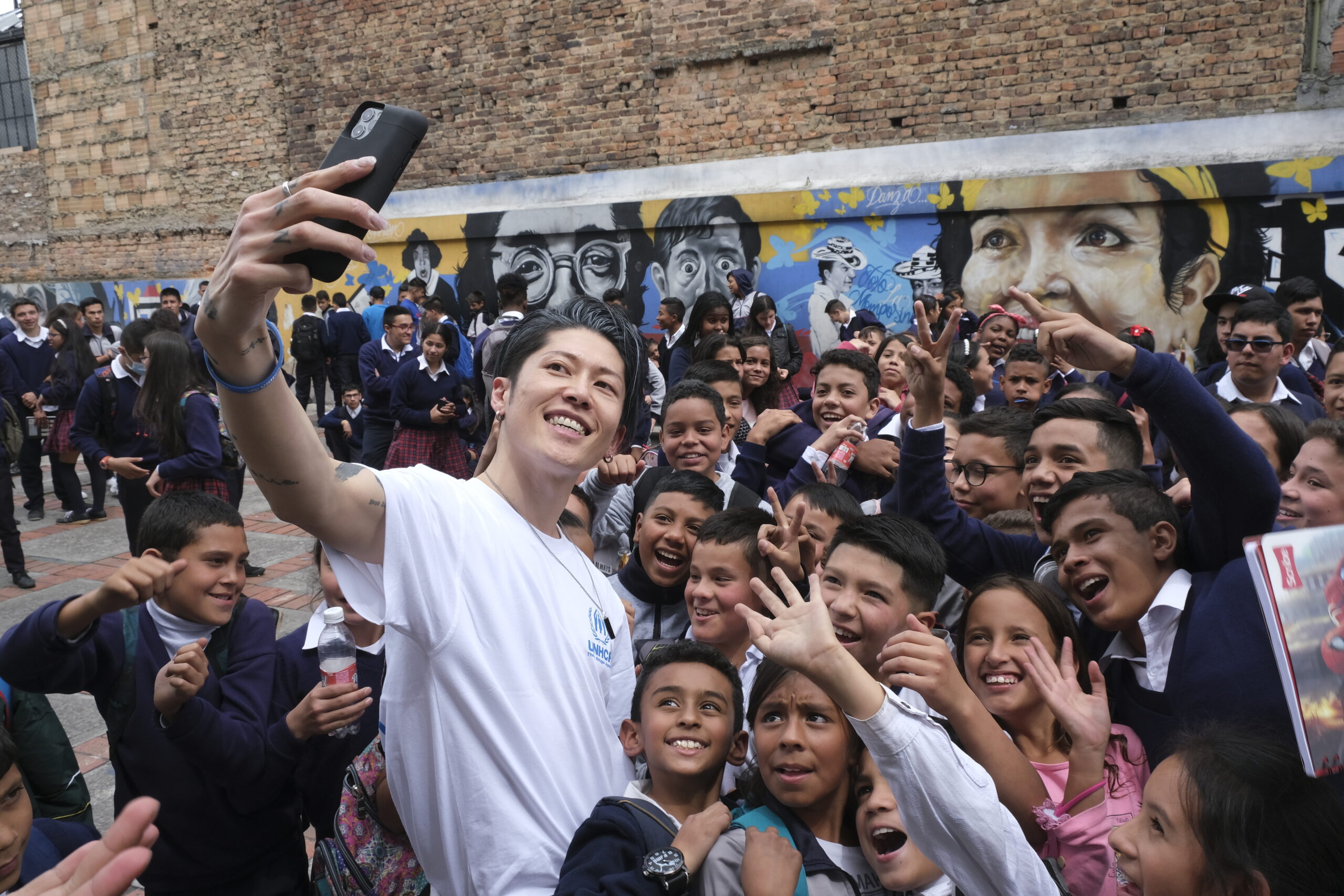
At that time, I had seen news of a novel coronavirus spreading in China, but I did not think it would affect me. After finishing my work in Los Angeles in February and returning to Japan, infection numbers were rising rapidly in Europe and the US, before the situation changed entirely in March. Japan also declared a state of emergency, and like everyone else my days of staying home began. I had a new album being released in April with a Japan tour to follow, and so I was in constant discussions with my staff over whether or not to cancel the tour considering the unprecedented crisis we were in.
As COVID-19 spread, I thought about many things. Thinking about what I could do, the meaning in entertainment existing, how I should act as a musician, what kind of information I should disseminate, why I continue making music. It was a time where I began to think a lot.
When travelling internationally for work, such as tours and filming movies, having established plans suddenly change is a rather common occurrence. No matter what the situation, I would always think about how to do my best given the circumstances I found myself in, and would keep in mind that unexpected changes could occur at any time.
During this pandemic, there may not be much we artists can do directly to save the lives of those who have been infected. However, believing there is something that can be done by artists and by entertainment, I started by doing what I could, providing music and performances to people working from home and unable to go to the office or children unable to go to school, people who have no choice but to stay at home and who are facing more and more mental stress, and providing support to frontline medical workers who are continuing to work despite the risks.
When thinking of what could be done from Japan, from Tokyo, during the state of emergency declaration, my only option was to begin sharing from my home. That is when I started doing family concerts on Instagram. Usually, I am frequently overseas on tour and away from home, but forming a band with my family allowed me to grow closer to my family through music. Wanting to share this experience with all my fans and those who support my efforts, at first I tried to do it as frequently as possible without any gaps, but doing it everyday was actually extremely difficult:) However, that also led to many new discoveries.
Especially in times like these, with everyone trying to figure out how to pass time that is painful and uncertain, I thought by sharing time together it would be possible to eliminate at least a little of that uncertainty. In a state of emergency, the difference between fans and musicians is not that important. I wanted to cherish the connections between people, and not just carry out show business as usual. The time we spent with those who watched our Instagram concerts was very precious to us as well, and I don’t believe I will ever forget the time spent under those conditions in 2020.
Next, I tried my hand at virtual concerts. Since the Japan tour was cancelled, I decided to try doing it virtually. Level 1 was streaming from my work space, Level 2 was from a studio while using a drone, and Level 3 was from teamLab to the world. I am very proud of all the staff who were involved, putting in their best effort while ensuring their safety as the coronavirus is still a major factor, and I feel it was very significant to have carried this out during 2020. We are also planning to hold a Level 4 concert in the future.
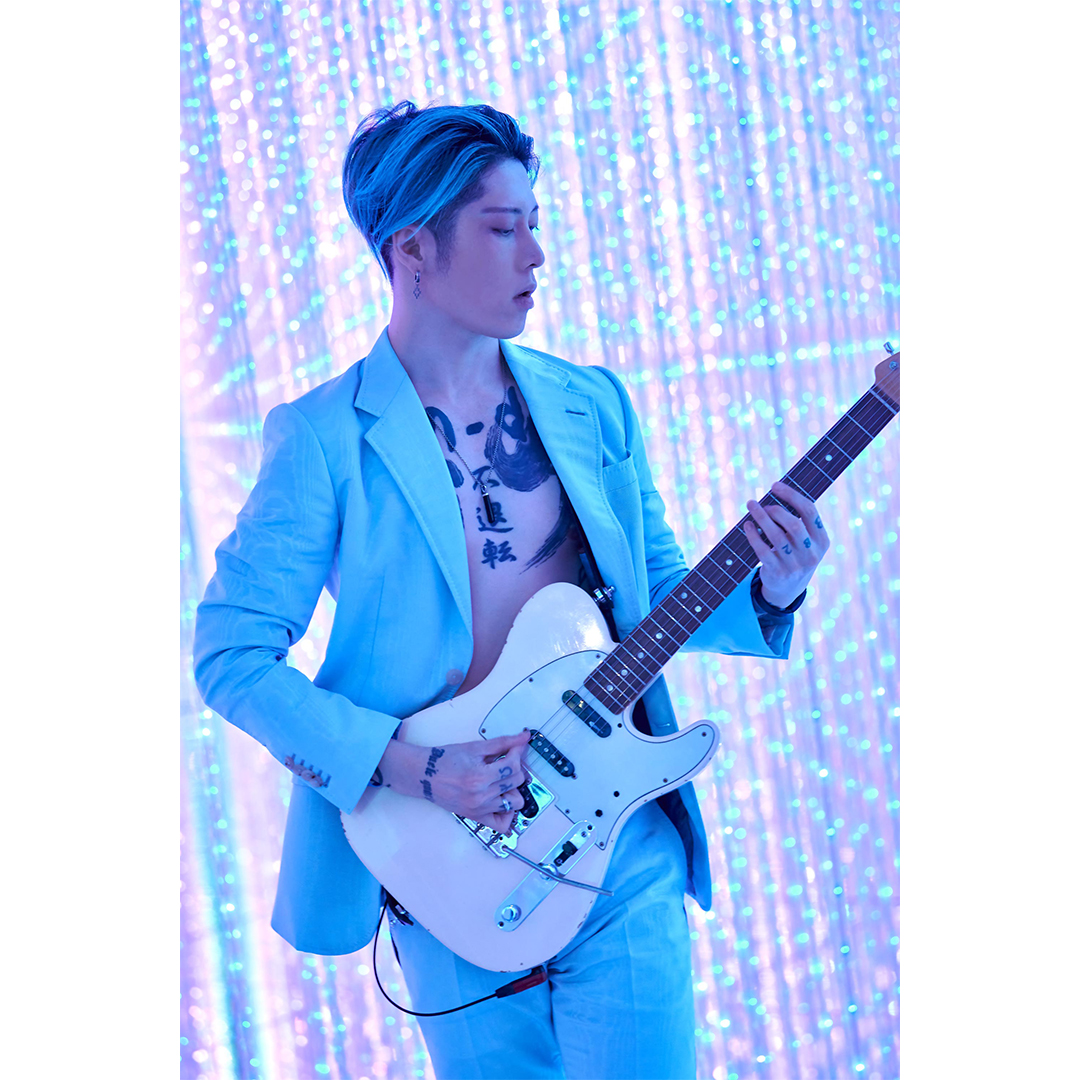
I feel to a certain extent it may have been unavoidable as a global trend that every industry is now in a situation where they must use technology. Moving forward, there will be more interactions between reality and the digital space. With remote meetings and online communication, things that were a given up until now have become difficult. When meeting online, there is none of the atmosphere, touch, warmth, or vibes of speaking with someone face to face. I feel that this has brought up questions such as what makes something real, and what the true connections between people are.
An event was being planned for World Refugee Day on June 20, 2020, inviting various musicians and charitable corporations just ahead of the Olympics, but it ended up being online this year. This was a very sensitive and difficult decision, as there was a gap between the enthusiasm in Japan and the situation in other countries including Switzerland, where the UNHCR headquarters is located. In the end, it was held online, with Japanese musicians sending messages expressing their thoughts, and I believe it was a very meaningful event to hold in Japan, where awareness of refugee issues is certainly not very high.
There is a responsibility that comes with speaking out. The participating musicians speaking from their individual positions, in their own words, is very significant in itself, and I felt a strong sense that we were beginning to reach people who had not thought about refugee issues before.
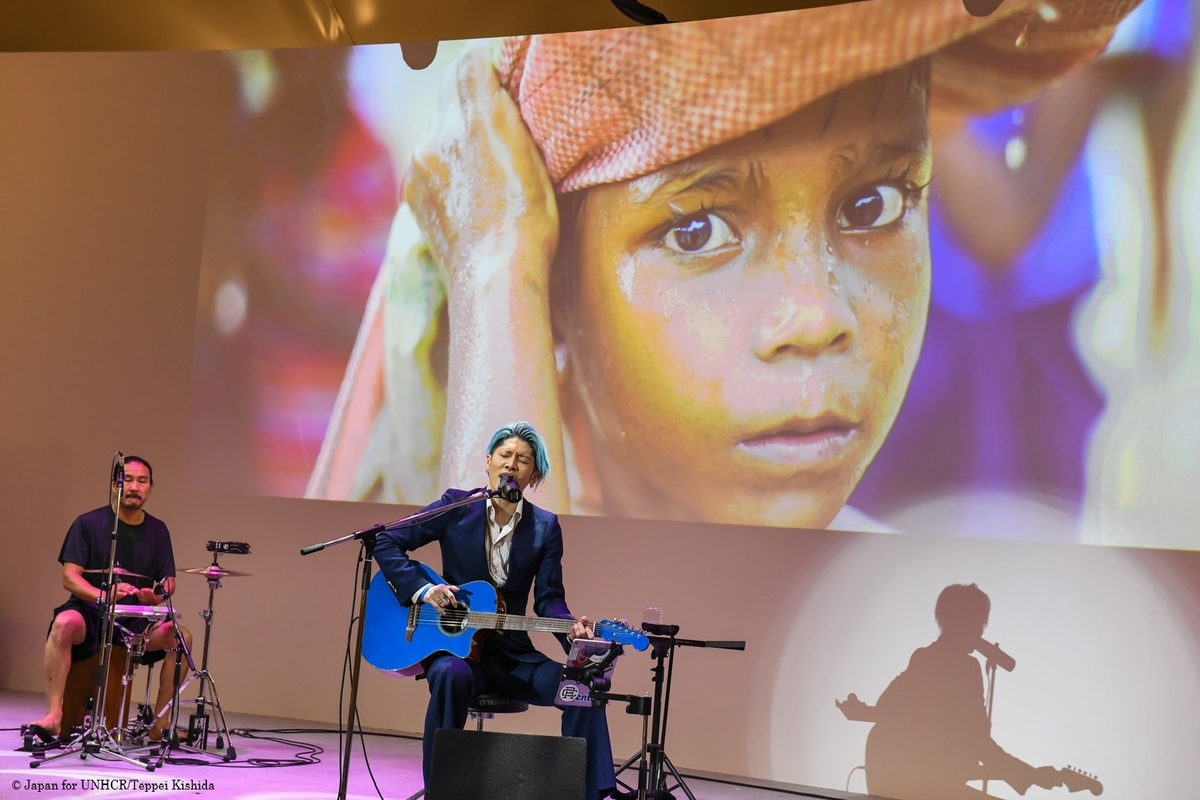
With Japan’s physical distance from the rest of the world, and now with the global crisis of COVID-19, it may be difficult for people to feel like refugee issues are relevant to them. But I think this situation is the perfect time to consider, “There are people in the world right now who are living through much harsher conditions than we are,” and there is much we can learn from them too.
In March 2020, I met unofficially with Yonas Kinde, a refugee athlete who had come to Japan to participate in the Tokyo Marathon, and his words left an impression on me. “I fled for my life from Ethiopia, and now I am living as a refugee. Now matter how much material or financial support I receive, sometimes when I am sitting in a café drinking tea by myself, I feel an unbearable loneliness.” When he said, “Sometimes I feel my existence is like air, and I am afraid of those around forgetting that I am living there, as time passes and I am unable to do anything,” he was crying. Isn’t this a feeling that those of us living in industrialized countries sometimes experience as well? Not something material, but human connections. That is what makes us feel like we are truly living. I feel the essence is the same, questioning how to have a connection with society and how to have your existence be affirmed.
Personally, as a UNHCR Goodwill Ambassador I am full of frustration right now because I am unable to visit refugee camps myself. My role is to go personally to those camps, and encourage the people there through the power of music. Then, having seen what is going on with my own eyes and having had a direct taste of the experience, I pass that information on to people around the world. Although being unable to travel right now is very frustrating, I can’t just waste my time complaining. So what can I do now, in Tokyo? As the first UNHCR Goodwill Ambassador from Japan, how can I spread awareness in this country of refugee issues? I would also like to learn more about the situation of refugees living in Japan. My mission in Japan now is to communicate about refugee issues to the people of Japan, and expand the circle of support.
I am cheering sincerely for Yonas and the other Refugee Olympic Team athletes who are training hard around the world in preparation for the Tokyo Games which were postponed to 2021, and look forward to the day when I will be able to meet with them in Tokyo.
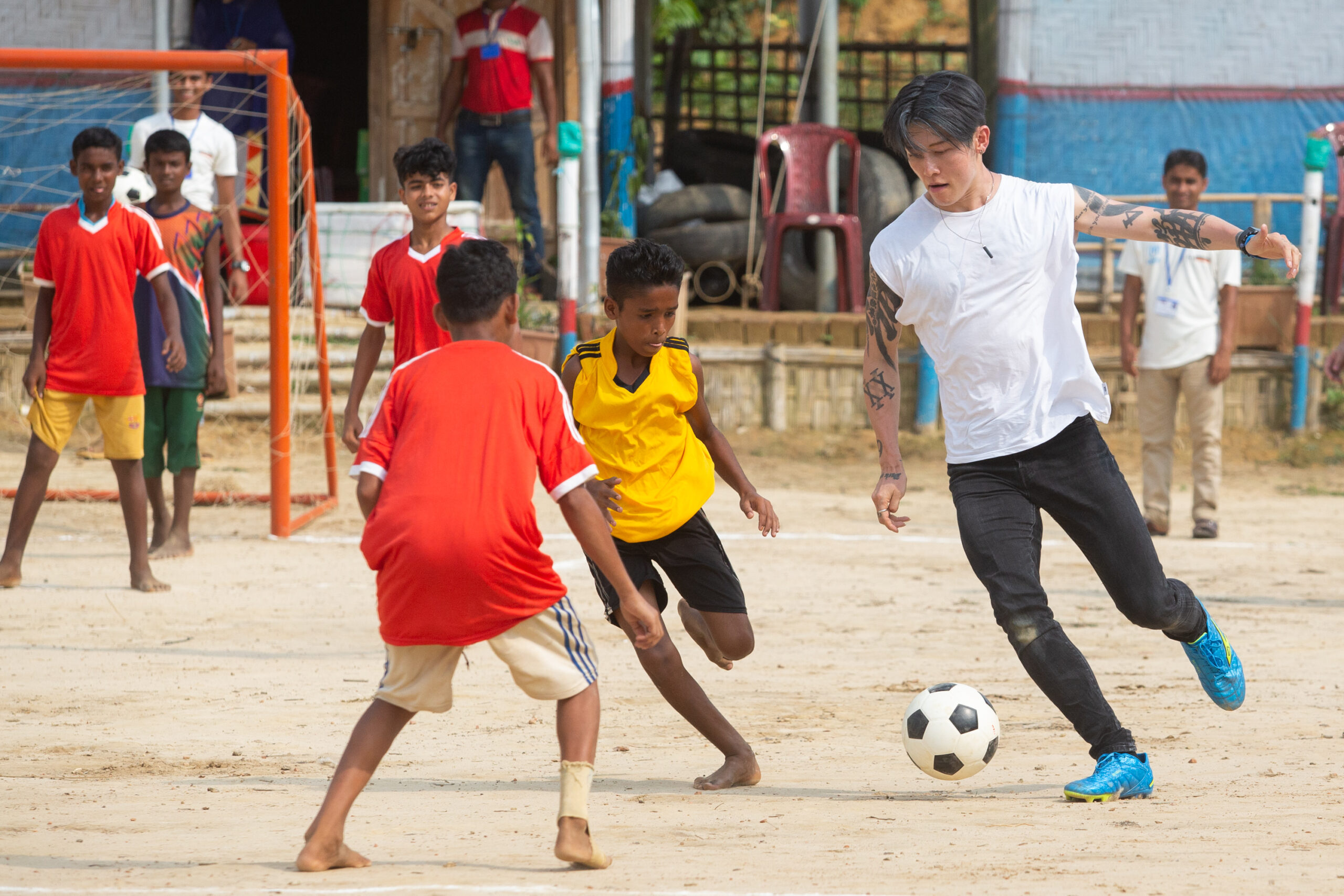
Being unable to tell what the future will hold is truly terrifying. This is true for all of us, whether you work at a major corporation, are an athlete, or live in a refugee camp. So how do we conquer this fear? The only way is to forge a new path. I believe strongly that there is no other path toward the future.
Lockdowns have stopped economic activity around the world, and our lives have fallen into pandemonium. But looking at in from another perspective, this may not have been a negative for the Earth itself. With the decline in traffic, the air became cleaner. Spending more time at home has led to new discoveries about ourselves and our families. This time may have been a necessary trial in order to achieve the Sustainable Development Goals (SDGs) and create a sustainable Earth for the future. Therefore, we must not return the economy to the state it was in before as if nothing had happened. What should be considered success? When thinking of success, the Earth and society as a whole should be considered as well, and I feel strongly that this pandemic should be used as a catalyst to shift in that direction.
Nothing will be gained from looking back and wondering what would have happened if not for COVID-19. Musicians can use lyrics and music to show the future we want to create. Being able to imagine a future is the first step to having hope. That is our role, and why we exist. This is something I was able to reaffirm during the pandemic. And that is why I would like to continue imagining the future.
Right now, history is at a crossroads. The problems we are being faced with on our planet are all so unbelievably massive, we feel powerless no matter what we try to do. However, if we all play our roles and connect with each other, we might be able to find a solution. Looking around the world, there are many people who feel the same way.
There are many people raising their voices, believing in the future. When in a tough situation yourself, helping others can be hard. Therefore, stabilizing yourself is the first priority. Once you have a solid foundation, then you can work to benefit the planet or help people suffering elsewhere in the world. Even if what you can do is small and limited, by continuing eventually everyone’s efforts can join together into a powerful wave. I strongly believe this to be true. Let’s do our best!
